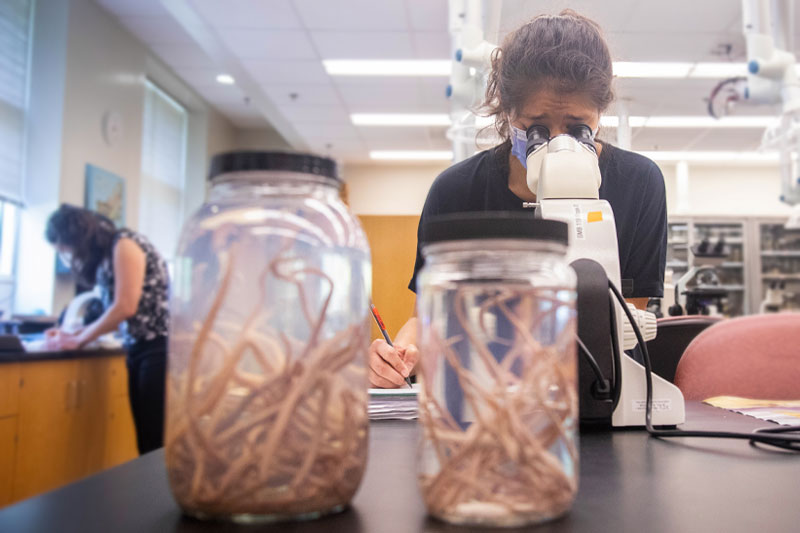
If you’ve always had an interest in life science, studying biology in college is a path you should consider.
Due to its nature of being such a broad field, there are numerous paths you can study, including:
We know, there are a lot of options, right?
Thanks to biological research, humankind has made essential advancements in medicine, agriculture, biotechnology, and quality of life. It’s allowed us to understand humankind’s past to help us shape the future and taught us what we could do to protect biodiversity.
With Raleigh ranked #5 in the nation in the life science industry, studying at Meredith College will give you an edge in launching and maintaining successful careers in biology while. In this blog post, we’ll highlight a few of the many career paths our previous biology majors have taken so you can see what jobs you can pursue with your degree in biology.
Research technicians, also known as lab assistants, are essential to every scientific laboratory. They set up, operate, and maintain lab equipment and test logs of experiments. As a research technician, it is your job to gather, interpret, and record relevant research and data. Some of the data you work on may be life-saving.
There are many different lab assistant careers, including
Every research technician job requires you to communicate effectively, manage your time properly, be detail-oriented, and have a love for science.
Here are just a few examples of where our strong graduates are working as research technicians:
Biology plays a vital role in healthcare. Biological sciences in healthcare focus on the underlying causes of health and infectious and chronic diseases. Those who have a career as a biologist in public health identify the causes of diseases, how they are transmitted, and how they can be controlled.
Those who study biology are not confined to exploring the underlying causes of health problems in humans but for any life as well.
Here are examples of Meredith biology graduates who are working in the medical field:
You can inspire future generations of science lovers by becoming a biology teacher. Think about the person who encouraged you to pursue your passion for science and how much of an impact they made on your life. Now you have the opportunity to be that person for someone else.
At Meredith, you can gain your North Carolina teacher licensure to teach grades 6-9 science or comprehensive science for grades 9-12. As a biology teacher, you’ll teach your students about the creation of life, plants, the earth, anatomy, cells, and more.
Here’s what some of our graduates are up to:
Many biology students further their education through professional programs, such as medical school, dental school, veterinary school, law school, pharmacy school, nursing school, Ph.D. programs, master of science programs, and more.
Here’s what our recent graduates have gone to further their education:
Medical School
Dental School
Veterinary School
Law School
Pharmacy School
Nursing School
Physical Therapy Programs
Physicians Assistant Programs
Ph.D. Programs
Master of Science Programs
Masters in Clinical Research Program
Masters of Public Health Programs
Why study biology at Meredith? Not only do we have a stellar track record, but our biology curriculum is designed to meet the needs of students interested in a wide variety of career areas related to biological sciences.
Our small class sizes and the opportunity for one-on-one work with faculty on research projects provide a personalized learning environment where you will get to know faculty and your peers. The biology program emphasizes professional development, making our graduates sought after in STEM fields.
Want to learn more about Meredith’s biology program? Visit meredith.edu/biology or contact the Office of Admissions today!
Sign up for our blog and get tips to help you write a strong college application essay. You’ll also receive valuable information every week to help you with your college search, including how to tell if a school is a good fit, how to pay for college, and more!
Share This Page
Office of Admissions
1st Floor, Johnson Hall
1-800-MEREDITH
(919) 760-8581
(919) 760-2348
admissions@meredith.edu
PRINCETON REVIEW
U.S. NEWS
NICHE
3800 Hillsborough Street Raleigh, NC 27607-5298 | (919) 760-8600 Fax: (919) 760-8330 | © 2024 All Rights Reserved.